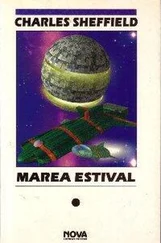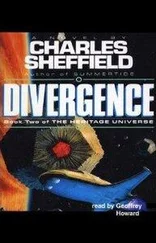“Have you been able to do an assessment of your overall war-fighting support potential, compared with that before the gamma pulse?” Saul had picked up a good deal of military jargon from General Grace Mackay.
“It is between seventy and one hundred and forty percent.” Dr. Liebchen answered without hesitation.
“One hundred and forty! You mean you might be more able to provide support now?”
“No. I mean that the answer to your question depends upon the nature of the assumed threat. The seventy percent number measures our support capability compared with its level before the gamma pulse, against an adversary whose fighting potential is unaffected by the pulse. That is not at all a reasonable scenario. Therefore, I estimated the effects of the pulse in diminishing adversarial war-fighting capability. To do so, I made use of previous estimates of the technological basis for foreign weapons. It turns out that our most likely and formidable potential foes — the Golden Ring compact — rely on chip-based weaponry even more than we do. We are, in that sense, better off — one hundred and forty percent better off — than before. Is that clear?”
“Perfectly clear.” Saul wanted to add, Dr. Liebchen, I think you are absolutely wonderful. How about a job in Washington?
He had enough sense not to say any of that (although the offer of a Washington position would indeed come, via Grace Mackay). What was Madeleine Liebchen doing here, in the middle of nowhere? Maybe she was a wind-and-water fanatic, as her ruined complexion suggested. Saul, whose idea of wide-open spaces was the atrium of a big hotel, was not going to find out. He went on, “I am terrifically impressed by the speed with which you have reacted to a unique problem.”
“Thank you, Mr. President,” Captain Kennecott said gruffly. “We just think of it as standard operations, Navy style. I’m sure other naval facilities have done no less. Shall we continue the tour of inspection?”
“Certainly.” Saul had learned something enormously important in the tour of Indian Head. He couldn’t yet say quite what it was. Everything had to ferment for an hour or a day in the murky wort of his subconscious, then he would know.
They moved on, wandering through the married housing with its children’s playground, past the deserted gymnasium, into the dusty library. Lots of old books there, and in the aisles between the stacks the forlorn and useless terminals. Beside the buildings, heaps of snow had a shrunken, defeated look. Clouds of gnats burst from the shade of towering magnolias, heading for sweaty faces and every square inch of exposed skin. The tall privet hedge on the road to the dead weapons warehouse, confused by weather that made no sense, had blossomed in a wild, perfumed, over-the-top-boys-it’s-now-or-never riot of white.
Saul was having the same spring-is-busting-out feelings. Indian Head had been a stimulant and a restorative — even the cathartic session with Yasmin felt full of future promise. He looked fondly on everything, including Dr. Liebchen, and did not mind when she frowned back at him.
At the entrance to another anonymous warehouse, he paused. Magnolias and munitions were all very well, but it was reality time. Washington waited.
“Captain Kennecott, this has been so interesting, I’ve lost track of everything. What time is it?”
“Ten minutes before noon, Mr. President.” The captain apparently had access to the Great Chronometer of the Universe, or at least a wholly nondigital watch.
“So late? I had no idea. I’m afraid I must be leaving. I must be back at the White House this afternoon.”
He had expected at least a token expression of regret. Kennecott said only, “Yes, Mr. President,” but Saul was trained in nuances. He heard unexpected satisfaction in the captain’s voice, and he caught the rapid eye contact with Dr. Liebchen.
It could be simple relief at getting rid of him, but Saul didn’t believe it. The pair of them were up to something. He would have suspected a formal salute and maybe the presentation of a memento of Indian Head, except that it was such a mismatch with his mental picture of Madeleine Liebchen. She would recoil at the notion of lapel pins and ceremonial farewells.
He was right, and he was wrong.
Saul and his band of followers and security staff walked back toward the river. The memento was waiting behind Mix House. A gigantic gray machine stood on a level concrete pad forty yards from the water, its forty-foot rotors drooping.
“All yours,” Captain Kennecott said. “Of course, you might say that as Commander in Chief it was yours already. And it is rather old. But we can guarantee this machine is perfectly airworthy. We’d be honored if you would take it for your use in Washington, maybe station it at Andrews AFB along with Air Force One.”
“What model is this?” Saul didn’t want to mention that he couldn’t identify most modern fighters, still less an ancient helicopter.
“A Sikorsky CH-53A — a Sea Stallion. It went out of use more than thirty years ago, but I’ll still take it over most modern choppers.” Kennecott patted the side of the monster affectionately. “Carries eight tons, travels five hundred miles at up to a hundred and seventy knots. You and your whole party can be landing on the White House lawn in twenty minutes.”
Twenty minutes. No leisurely return trip, then, but Saul didn’t regret that. He shook hands all around and his thanks to Captain Kennecott were totally sincere. From the moment when he saw the Sea Stallion, he had known what needed to be done when he arrived back at the White House.
As Saul climbed into the helicopter’s great hollow interior, big enough to take a fair-sized truck, another thought hit him.
Washington waited. Tricia also waited. In six hours, he would be face-to-face with her for the first time in over two years.
From the secret diary of Oliver Guest.
Never match wits with a Jesuit. I don’t claim that was my waking thought, because in those first few minutes I either had no thoughts at all or I did not later remember them. Returning from the dead is nothing if not confusing.
But I did think about Father Carmelo Diaz and the deal that we had made. Then not long afterward I realized that my eyes were open. I could see a light. I also realized that someone was speaking, although not to me; and I found that I could not move a muscle, not even an eye muscle. This was terribly frustrating. I saw only what was right in front of me, and that badly out of focus.
Wherever I was, and whenever I was, I knew two things with certainty: I was alive; and I was not undergoing a standard revivification.
Not, at least, revivification as it had been known at the time of my descent into abyssal sleep in the year 2021. For of course, I assumed on waking that I had been in abyssal sleep. Only later did I learn otherwise. So my mind said, this is 2621. I have served my sentence, and I have survived.
Consciousness was not continuous. Clouds of darkness billowed in and out. In random snapshots, by a weak and flickering light, I saw people.
First it was a stocky, strongly built man with ill-cut short hair and a two-week stubble of black beard. He was dressed in grubby black pants and jacket, and he was wrapping a blanket around me.
A total collapse of civilization, with this as a specimen of degraded humanity? Possible, but not plausible. What he said was nothing out of the ordinary ("He’s a weight. We’ll have one hell of a time gettin him down them stairs ’less he can walk.") but the accent was pure West Virginia. I couldn’t believe that the dialect would have survived unchanged over six centuries. Could he be a criminal, sentenced like me in 2021 and only recently revived?
Читать дальше












